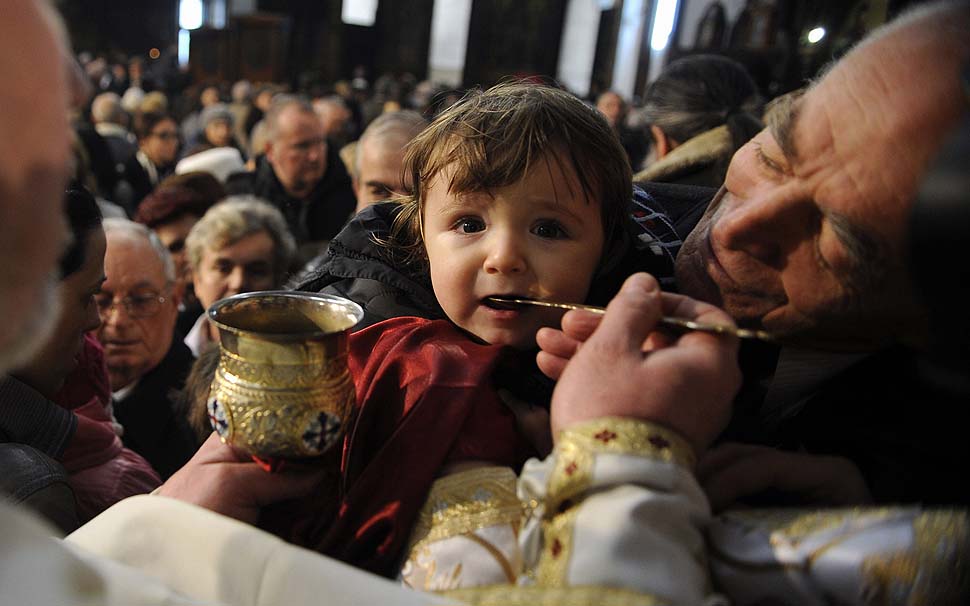“Those who say that infancy has nothing in it for Jesus to save, are denying that Christ is Jesus for all believing infants. Those, I repeat, who say that infancy has nothing in it for Jesus to save, are saying nothing else than that for believing infants, infants that is who have been baptized in Christ, Christ the Lord is not Jesus. After all, what is Jesus? Jesus means Savior. Jesus is the Savior. Those whom he doesn’t save, having nothing to save in them, well for them he isn’t Jesus. Well now, if you can tolerate the idea that Christ is not Jesus for some persons who have been baptized, then I’m not sure your faith can be recognized as according with the sound rule. Yes, they’re infants, but they are his members. They’re infants, but they receive his sacraments. They are infants, but they share in his table, in order to have life in themselves.”
St. Augustine, Sermon 174, 7
WHAT IS PAEDOCOMMUNION?
Paedocommunion is the practice of giving the Lord’s Supper (Holy Communion or The Eucharist) to baptized children. Such children participate apart from a coming-of-age ritual such as Episcopal confirmation or profession of faith.
Paedocommunion is denied today by those who have been misinformed on its origins and historic practice. A Facebook friend points out here that most Roman Catholics, Lutherans, and Reformed Christians follow the practice of the Council of Trent to deny Holy Communion to children.
Although, this is only partly true. Rome acknowledges that their view is a historical development of the church and does not prohibit paedocommunion in their churches.
In fact, Rome has under its faithful, tens of millions of members in uniate churches (Melkites, Ruthenians, Maronites, etc) that weekly practice paedocommunion without issue. A practice unbroken in antiquity of the Eastern Churches.
John Calvin even wrote of infants receiving communion in the Early Church: “This permission was indeed commonly given in the ancient church, as is clear from Cyprian and Augustine…”
Rome acknowledges that its ancient fathers and liturgies once combined Baptism, Confirmation, and Communion into a single service for infants – as evidenced in the writings of Hippolytus of Rome (c. 170–235 AD). Further Rome acknowledges that infant communion was demanded by its own canons for children in mortal peril.
What is worse is that the history against paedocommunion coincides not with anti-sacramentalism, but rather with the belief in transubstantiation.
It is the Roman superstitions about the Sacrament that drove the church in the 12th century (Yes, as late as the 12th century!) to first deny the bread to infants for fear that they would regurgitate it and desecrate the “transubstantiated” body of Christ.
The infants were still given the cup until 14th century when the Roman church removed the chalice (receiving wine) from all of the laity. This move approved by the Council of Constance was motivated (again) by a superstitious desire to protect the wine from desecration. (Rome also believes to receive one kind, was to receive both.)
This move completely removed infants from communion, as they could not have the bread. Which by this time was given on the tongue only – to prevent any crumbs from falling to the ground. Again the gross superstitions accompanied the anti-paedocommunion side. Both practices have since been reversed in the Roman Church – the chalice restored to the lay people and communion bread may again be received in the hand.
Over and over this practice is based on Rome’s desire to place more superstition into their understanding of the Eucharist. While at the same time, Roman apologists developed new justifications for the church’s changes.
Individuals who appeal to one’s rational ability/responsibility to receive the eucharist follow the theological tradition of the Council of Trent – that itself relies on the scholastic idea of an “age of reason.” An idea wholly foreign to any previous era of sacramental theology in the church.
It is Medieval Roman Catholic theology that introduces the arbitrary use of an “age of reason” (typically seven years old) for confirmation and therefore entrance to Holy Communion. The Reformed Churches that refused communion to their children followed the Roman scholastics in placing intellectual ability to discern the meaning of the sacrament as a new barrier for receiving the sacrament.
A novel superstition born wholly in Roman Catholic history/theology and carried into the Reformed Churches.

Leave a ReplyCancel reply